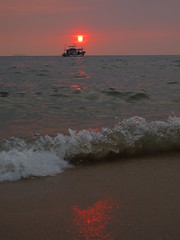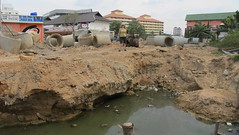 We started our Thailand exploration in Pattaya because friends spend their winters here. One of them warned us that “Pattaya won’t be the Thailand you are wanting to see” — and we expect he will be right!
We started our Thailand exploration in Pattaya because friends spend their winters here. One of them warned us that “Pattaya won’t be the Thailand you are wanting to see” — and we expect he will be right!
Pattaya is packed with people from all over the world: it is easy to get to, has great weather, lovely beaches, good food—and reasonable prices.
And of course one of the key attractions for many visitors is sex. Older Western men holding hands with pretty young women—and equally pretty young men—is common. Pattaya is also a popular gay destination: the downtown night life in some locations is certainly not for the homophobic—nor for anyone who will be bothered by obvious sex trade activities. But it isn’t as overt as we’d expected, and certainly not a reason to avoid the area.
 More troubling is the apparent lack of long-term planning for sustainability. Money is pouring in and growth seems almost out of control, with sleek high-rise buildings springing up next to vacant lots or ramshackle slums. A major road was being built to ease congestion on the beach road, but it seemed unlikely that the smallish pipes we saw would cope with the need for water and sewers for the giant condos being built.
More troubling is the apparent lack of long-term planning for sustainability. Money is pouring in and growth seems almost out of control, with sleek high-rise buildings springing up next to vacant lots or ramshackle slums. A major road was being built to ease congestion on the beach road, but it seemed unlikely that the smallish pipes we saw would cope with the need for water and sewers for the giant condos being built.
The contrasts are fascinating, albeit a bit hard to take at times. Our friends live in a very nice development with a well-planned mix of single family units, 3-story condos and a central high-rise; all within a walled area with easy walking access on tree-lined paths to the beach. However, a nearby high-rise condo looks drearily like a high-rise anywhere, crowding the beach and blocking the water views from an earlier one built a bit further back.
 Some other contrasts are temporary: across the street from the guarded entrance is a family-operated chicken roasting cart: chickens turn on spits while cars zoom past and kick up dust just feet away—and a suspiciously bad smelling liquid streams under the cart into a nearby grate… Granted, this is on a road that is under major construction only a kilometre away, and the chicken vendors won’t be able to occupy the space soon, but it is typical of what we came across as we walked along the street.
Some other contrasts are temporary: across the street from the guarded entrance is a family-operated chicken roasting cart: chickens turn on spits while cars zoom past and kick up dust just feet away—and a suspiciously bad smelling liquid streams under the cart into a nearby grate… Granted, this is on a road that is under major construction only a kilometre away, and the chicken vendors won’t be able to occupy the space soon, but it is typical of what we came across as we walked along the street.
Sun destinations of the past probably went through a similar stage: the Riviera in France, or the Costa del Sol in Spain would have gone through a transition from backwater fishing villages to the tidy streets and established tourism services of today.
However, since such destinations will always appeal to those of us from higher latitudes, shouldn’t we take some responsibility for ensuring that things are done for the long-term? Perhaps the inexpensive living should cost more, and the difference be put into paying for all of the infrastructure from the start.
Right. In these days of “the lowest price is the law” that kind of thinking is just dreaming—and it is equally unlikely that the money would actually be spent effectively to develop the infrastructure.
